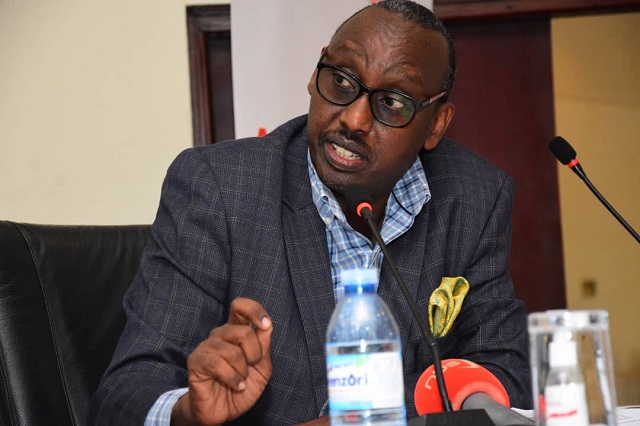
Players task government to walk the talk at 13th national competitiveness forum
Kampala, Uganda | JULIUS BUSINGE | Private sector players have asked government to walk the talk while promising to boost private sector activities that drive overall growth of the economy. The call was made by multiple speakers at the 13th National Competitiveness Forum organized by the Ministry of Finance, Planning and Economic Development and the National Planning Authority in Kampala on Dec.01.
The forum aimed to bring together different players to deliberate on ways in which private sector development can be achieved. Stephen Asiimwe, the executive director at Private Sector Foundation Uganda (PSFU) said, government should tangibly invest in areas that makes it easy for the private sector to thrive including infrastructure – roads, airports, electricity – especially now that more new businesses are being established.
He said key investments in education and health could trigger growth in the two sectors in the event that the country starts to receive patients from outside countries. “That means the country would earn foreign exchange and also support growth of other sectors like health, tourism indirectly,” Asiimwe said.
He also urged security personnel to incentivize private sector players that deal in exports for perishable goods. “If you are a traffic officer and you stop a vehicle transporting perishable goods to the airport…just know you are wasting time for the exporter,” he said, “There should be special consideration for these exporters to make it convenient for them to do business.”
Meanwhile, Asiimwe urged government to work closely with the private sector to support an emerging arts and culture sector, which he said has potential to add a lot of foreign exchange and jobs to the country like it is doing in countries like Nigeria. He also said, Uganda’s construction sector should be heavily linked to local content rules to support local investors.
Anna Nambooze, the country director for TradeMark East Africa said any form of support to the private sector geared towards supporting exports is a welcome move given its contribution to job creation, foreign exchange gains and overall growth of the economy. She said, special emphasis should go towards strengthening operationalization of economic zones which are critical in ensuring businesses operate smoothly.
She added that more government business trustworthy initiatives like the Authorised Economic Operator (AEO) spearheaded by Uganda Revenue Authority – that makes it easy for taxpayers to report about their tax compliance – should be supported so as to attract more investors into Uganda’s private sector.
James Karama, the head of client coverage at Stanbic Bank Uganda said, competitiveness is about improving efficiency and building local capacity in terms of credit and market access, standards and easing transactions. He said, Stanbic Bank’s sister company, Stanbic Business Incubator was supporting in this area through training business players in a number of areas including corporate governance, financial accounting, book keeping and more.
He revealed that two years ago, Stanbic launched the ‘Stanbic Bank Trade Club’, a digital platform for businesses to find markets, get trade information or connect with other local, regional and international traders. “It is a free platform that offers trade expertise with access to importers and exporters across 190 countries offering over 200 pages of trade information on both importing and exporting, customs information, market analysis and reports,” Karama said.
He also talked about the borderless solution that enables customers to carry out transactions at any Stanbic/Standard Group Bank branch within the East African region. “These are processed as quickly as if they were being done at the customer’s home branch,” he said.
He said, between January 2021 and March 2022, the transactional volume reached US$40million from virtually zero in January 2021. And from February to March 2022 alone, the volume of successful transactions grew 24%, with a total value US$3.5 million in transactions processed in March.
Patrick Ocailap, the deputy permanent secretary and Secretary to the Treasury said, government is committed to continuing with strategic partnerships with key stakeholders to drive private sector development. He said, competitiveness is about exports and that the participation of the private sector is critical in the creation of both formal and informal jobs.
“The private sector provides 90% of jobs in the economy, delivers goods and services, contributes to tax revenue, undertakes investments and promotes efficient capital flows. He said, the forum is in line with government’s development agenda which is premised on industrialization, employment and wealth creation.
According to the Bank of Uganda monetary policy report for October, Uganda’s financial account surplus, which is linked to export performance, remained depressed, despite expanding by 18%, relative to the three months to May 2022. The report says, overall balance of payment deficit of $391million was reported in the quarter to August 2022, more than double the deficit of $127million in quarter to May 2022 – pointing to the fact that export promotion for Uganda is paramount.
 The Independent Uganda: You get the Truth we Pay the Price
The Independent Uganda: You get the Truth we Pay the Price



